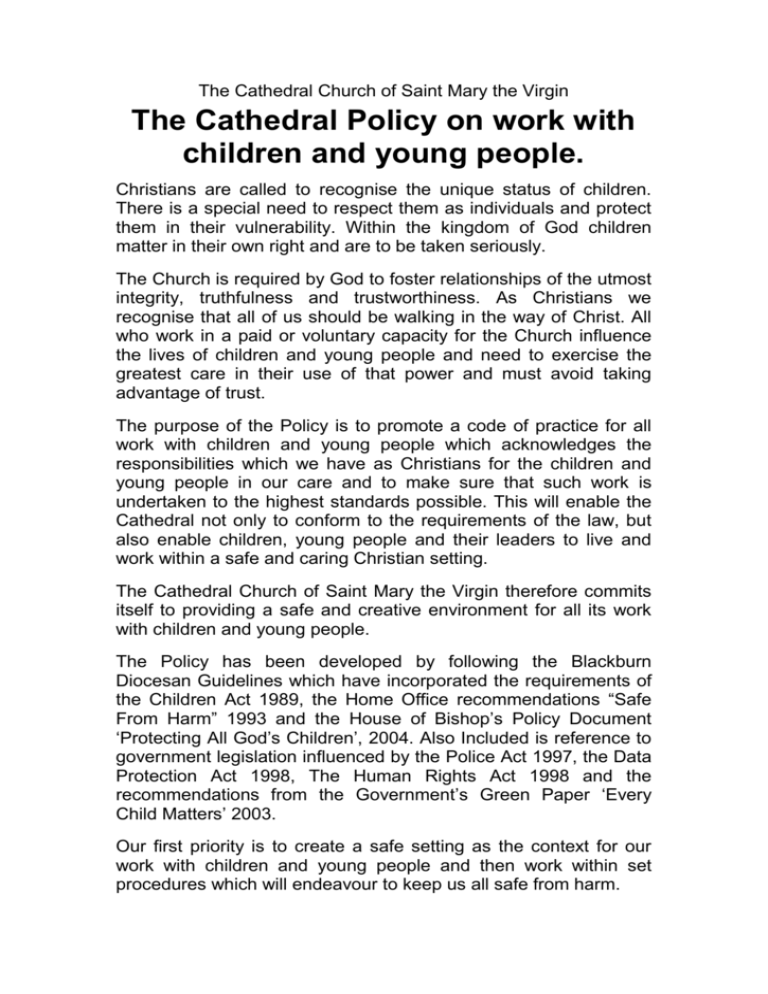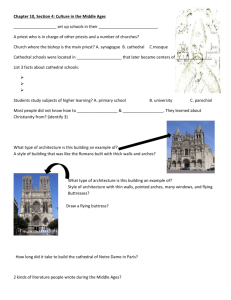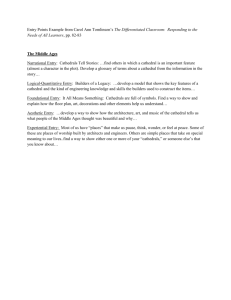The Cathedral Church of Saint Mary the Virgin
advertisement

The Cathedral Church of Saint Mary the Virgin The Cathedral Policy on work with children and young people. Christians are called to recognise the unique status of children. There is a special need to respect them as individuals and protect them in their vulnerability. Within the kingdom of God children matter in their own right and are to be taken seriously. The Church is required by God to foster relationships of the utmost integrity, truthfulness and trustworthiness. As Christians we recognise that all of us should be walking in the way of Christ. All who work in a paid or voluntary capacity for the Church influence the lives of children and young people and need to exercise the greatest care in their use of that power and must avoid taking advantage of trust. The purpose of the Policy is to promote a code of practice for all work with children and young people which acknowledges the responsibilities which we have as Christians for the children and young people in our care and to make sure that such work is undertaken to the highest standards possible. This will enable the Cathedral not only to conform to the requirements of the law, but also enable children, young people and their leaders to live and work within a safe and caring Christian setting. The Cathedral Church of Saint Mary the Virgin therefore commits itself to providing a safe and creative environment for all its work with children and young people. The Policy has been developed by following the Blackburn Diocesan Guidelines which have incorporated the requirements of the Children Act 1989, the Home Office recommendations “Safe From Harm” 1993 and the House of Bishop’s Policy Document ‘Protecting All God’s Children’, 2004. Also Included is reference to government legislation influenced by the Police Act 1997, the Data Protection Act 1998, The Human Rights Act 1998 and the recommendations from the Government’s Green Paper ‘Every Child Matters’ 2003. Our first priority is to create a safe setting as the context for our work with children and young people and then work within set procedures which will endeavour to keep us all safe from harm. Who is responsible for Child Protection? The Dean The Dean has ultimate responsibility for policy and all safeguarding procedures in the Cathedral. The Chapter Approving the policies and ensuring annual review. Appointing the Safeguarding Group and overseeing its work Ensuring adequate financial provision as agreed in the annual budget for implementing Safeguarding Procedures, including training. The Safeguarding Group Role of Group To be responsible for developing and overseeing policy and strategy and supervising its implementation. The group is fulfilling this role on behalf of the Chapter and will report annually to Chapter. The Group will not deal with practical issues or queries (those should remain with the under-18s coordinator, and his/her equivalent for vulnerable adults.) Terms of Reference 1. Responsible for developing and reviewing the Cathedral’s safeguarding policies, ensuring compliance with relevant and most up-to-date legislation. 2. Responsible for ensuring the implementation of policies and appropriate training for all cathedral clergy, staff and volunteers. 3. Responsible for monitoring and evaluating safeguarding procedures 4. Responsible for the annual review of policies, and for recommending the adoption of policies to Chapter. U18s Co-ordinator Appointed by Chapter and supported by Safeguarding Group In summary, the role of the U18s co-ordinator is i) to provide advice and support to all group leaders of Cathedral organisations involving work with under 18s, ii) to advise the Dean and Chapter iii) to act as a reference person for the development of good practice. The under-18s coordinator may appoint one or more assistants to act on his/her behalf with the approval of the Safeguarding Group. This appointment does not relieve adult group leaders or the Dean and Chapter of their responsibilities for Safeguarding and Child Protection. The Chapter require that leaders will give the Co-ordinator their fullest support and co-operation. The Under 18s Co-ordinator can be contacted at the address given in the Cathedral’s monthly diary, choir diary, and as displayed on all relevant noticeboards. A full role description for the post of Under 18s Co-ordinator is included in this document in Appendix 2. Group Leaders (whether employees or volunteers) These are the overall leaders of Cathedral Groups. The Group Leaders are responsible for the well-being of all members of their groups during Cathedral activities, including: Preparing a report (both review and future programme) on activities 3 times a year (see p5) Ensuring adequate staffing for all activities Keeping a register of delegated leaders and helpers in their group, and updating it twice a year Initial induction of delegated leaders and helpers Keeping the Safeguarding Log and Accident Book up to date Risk assessment procedures and obtaining permission for off-site visits Ensuring appropriate parental consent Keeping attendance registers First Aid Health and Safety Delegated Leaders and Helpers Delegated Leaders may run activities in the absence of the Group Leader, and will be responsible for all aspects of that particular activity, including Child Protection. Helpers, may be present in an assistant capacity but will not normally be left in charge of an activity. They should be competent in basic Child Protection issues in case circumstances temporarily leave them alone with children. Children’s Advocates It is unlikely that the person appointed to the role of Under 18’s Co-ordinator for the Cathedral will know every young person who takes part in activities at the Cathedral. In order to ensure that young people have access to support and advice when participating in activities, Children’s Advocates may be appointed by Chapter. Children’s Advocates will fulfil a number of roles. They will: be an additional resource available to the Leaders of groups, who may be faced with child protection issues. listen sympathetically to young people, take appropriate action, and report any concerns to the U18’s co-ordinator, and The Dean. undertake appropriate training to fulfil this role and will liaise with the Under 18’s co-ordinator. All those who have contact with children and young people, whether as employees, volunteers or members of the congregation. THE CATHEDRAL CHURCH OF SAINT MARY THE VIRGIN, BLACKBURN The Procedures to implement the Cathedral Policy on work with children and young people. Guidance and Key requirements for Cathedral Groups Cathedral Groups are all groups involving children and young people which meet under the auspices of the Chapter. For the current list see Appendix 1 Aims and Objectives For each Cathedral group there will be a description of its purpose, including the age group it covers, the overall aims, current Group Leaders, the insurance cover arrangements, its meeting place and times and a brief description of its range of activities. Each term’s programme should be submitted in advance to the under-18s coordinator, and relevant changes notified in advance wherever possible. A new group would require the Chapter’s approval before commencing meetings. The Under 18s Co-ordinator will keep copies of these documents on behalf of the Chapter. Each leader will receive a specific role description for the involvement undertaken from the person responsible for their appointment; copies of the role descriptions will also be lodged with the under-18s coordinator. Model copies of the Group Compliance Form and the Aims and Objectives Form can be found on the website or obtained from the Under-18s Coordinator. Independent advice and disclosure In order to fulfil the Cathedral’s commitment to providing opportunity for independent advice and support for children and young people, the Chapter has agreed to display the Child Line number on its notice boards in the cathedral. In addition the Chapter has appointed a number of Children’s Advocates who will be available for children to speak to about concerns. Advice on advocacy for children will be included in group leaders’ initial training by the Under 18s Co-ordinator or other qualified diocesan representative. Role Descriptions Each person, whether employee or volunteer, undertaking work with under 18s will have a clear role description which will set out the key features of what that role involves, how this relates to others and to whom the person is responsible. The role descriptions will be agreed with the Chapter and the Under 18s Co-ordinator. When new appointments are made role descriptions will be part of the appointment process. The list of registered roles should be reviewed annually by the Chapter. All leaders of cathedral groups will have their role description reviewed individually and annually by the person to whom they are responsible named on their role description and the outcome of the review notified to the under-18s coordinator. All Group leaders will be over 18 years of age. For one-off events which require additional helpers, a list of those recruited to act as helpers, including names and addresses, will be submitted to the Dean or in his absence the under-18s coordinator for approval prior to the event. Notification of Programme Group Leaders of Cathedral groups will submit their programme / Diary to the Dean and Chapter via the Cathedral U18’s coordinator at the beginning of each term. Review of activities Group Leaders of Cathedral Groups will prepare reports about activities undertaken during the previous term to be presented to the U18’s coordinator, who will prepare a written summary for the Chapter. These reports should be presented in December (for the Autumn Term) In April (for the Spring Term) and in July (for the Summer term) Training and Induction All leaders of cathedral groups will be given copies of the Cathedral Policy and Procedures and opportunity to familiarise themselves with the content. All group leaders will be guided by the person to whom they are responsible and/or the Under 18s Co-ordinator through the procedures for dealing with disclosure of abuse. All new group leaders on registration will receive an induction from the Under 18s Co-ordinator which will explain the Procedures. They will be given their own copy of the Cathedral Policy and Procedures. Group leaders will be required to give new helpers an initial induction to their specific role within the group and to make sure that they are familiar with the procedures as they affect the particular group with which they are involved. All Group leaders should undertake ongoing training in Safeguarding as recommended by the Diocese which is relevant to the age group with which they will work, and other leaders and helpers will be encouraged to do so. The Cathedral budget has provision for training for those working with children/young people, including Safeguarding Training. Attendance Records Records of children and young people attending Cathedral groups will be kept. The information will include names, addresses, telephone numbers, date of birth and an emergency contact number together with any special/additional need that has been identified by the parent/carer. A copy of an Annual Registration Form is available on the website or from the Under-18s Coordinator. It is the responsibility of each group leader to keep the attendance record of the children and young people with whom they work. Any young adults who are included as helpers must also be included in the register. Off-site Activities For all “off-site” activities such as trips, residential visits, outside events, away days or any activity requiring staying away overnight, this Cathedral will follow the Diocesan Guidelines for Off Site Visits. This includes off site visits during normal meetings. Forms and guidance for Visits are available on the website or from the Under-18s Coordinator. Chapter approval will be required for specific off site visits. The Dean and under-18s coordinator will review the risk assessment and other arrangements submitted and recommend acceptance to the Chapter. Please note that specific Chapter approval is essential for the Cathedral’s insurers, and should be minuted, and any subsequent changes approved as soon as possible. All off-site visits must have Chapter approval; however some shorter outings may be given interim approval by the Dean or Canon responsible for this area of work and then reported to Chapter. Procedures when working with children and young people. Staffing Leaders, or helpers, must not work on their own with under-18s. With all cathedral groups a minimum of two leaders will work together. At no time will anyone under 18 years of age act as a leader, but, when appropriate, a person under 18 years of age may act as an assistant under the supervision of a recognised leader. Within all groups it is hoped to attract and recruit both male and female leaders, but with groups for those young people over 10 years of age where the gender is mixed, the aim will be to ensure, when possible, that both a male and female leader is present. At times when the numbers of leaders is unexpectedly low (e.g. leaders fail to turn up due to illness) the remaining leader(s) should, if necessary, change or reduce the activities planned in order to maintain control of the session. If possible a parent could be asked to stay in such an emergency or be asked to contact another recognised leader. Leaders should be mindful of the need to ensure that Child Protection requirements continue to be met. Where it is either necessary or appropriate for a leader to work within a one-to-one situation (e.g. counselling or confidentiality), this must take place within clear and explicit professional boundaries, following diocesan advice and agreed with the Group Leader. The following ratios will be followed by all cathedral groups with the exception of the Music Department: 0 to 2 years 1 adult to 3 children. 2 to 3 years 1 adult to 4 children. 3 to 8 years 1 adult to 8 children 8-18 1 adult to 10 children. In particular circumstances, such as vigorous sports, trips, group visits etc. the ratios will need to be higher. The group leaders may recruit additional helpers for such oneoff situations. In order to cater for those children and young people with particular special needs and to provide adequate care and supervision, the leadership ratio will need to be higher, allowing, where possible and appropriate, individual carers. The nature of this additional support will be agreed with the parents, and documented within an individual care plan for their membership of that group. Staffing arrangements for Music Department In the case of the Music Department for rehearsal purposes and performance it is expected that the ratios will be akin to those maintained in an educational establishment. i.e. for 8 – 18 year olds 1 adult to 30 children. However another adult e.g. another member of the department should be on hand in case of illness etc. In the case of mixed sex groups (eg Girls choir and YPC) it is considered good practice to have both a male and a female adult responsible for supervision and welfare, a volunteer with CRB clearance would be acceptable. In the case of Choir outings the adult to young person ratio should be at least 1:10. Who should be CRB checked? Any Group Leader, Delegated Leader, Helper or other volunteer who may have unsupervised access to children should have enhanced CRB disclosure. This will include all adult members of mixed-age choirs, but not parents/carers unless they are volunteering to supervise children. Transport Where it is necessary to transport children and young people to activities, transport arrangements, including the names of drivers, must be included on the Parental Consent Form. Ideally, if cars are being used there should be another adult in the car as well as the driver. If this is not possible then children must not be transported alone. Seat belts should be worn at all times and it is the driver’s responsibility to ensure that each passenger is provided with a seat belt. When transporting children under the age of 12 or height 154cm (4ft 5 inches) booster seats must be used, in accordance with current legislation. If it is not possible for another adult to travel in the car, the group should travel in convoy so that assistance is close at hand if necessary. Each driver is responsible for the insurance of his/her vehicle and must agree for its use for a group activity. When a mini-bus is used it is important to ensure that seat belts are fitted and in use. At all times another adult should travel in the vehicle with the driver. The use of mini-buses is only allowed where qualified drivers follow the Midas agreement. Parental Consent Consent forms will be used in the following circumstances: When the group is meeting outside its normal meeting time and/or place. When the group may be involved in a potentially hazardous activity. When the topic for the meeting could be deemed to be controversial or outside the normal remit of the group’s programme. Parental consent will be required for any “All Age” events and activities where children and young people unaccompanied by their parent(s)/responsible carer may be present. Adults willing and able to act in loco parentis will need to be identified and agreed with the parents in writing. In some circumstances, e.g. group visits to a Theme Park, attendance at Diocesan/Deanery celebrations or events, being part of a Festival, it will not always be practical or possible to maintain constant supervision. For such events parents will be informed of the arrangements and understand the level of supervision that can be provided. Supervision should be at a level that is age appropriate for the children/young people being supervised. Parental consent forms will be used for each appropriate activity. Please note: Parents/guardians will be asked to complete a registration form at the beginning of each academic year for the groups with which their child/children is/are involved. Copies of Parental Consent Forms will be held by the Music Administrator in the Cathedral Offices, and copies made available to the Under 18s Co-ordinator and the Leaders of groups as necessary. Copies of the forms to be used are available on the website or from the Under 18s Coordinator. Appointing new Group Leaders and Helpers Procedure for appointments All adults taking up new roles with the possibility of access to under 18s will be required to comply with the Cathedral’s appointments procedure. It is a requirement that the person(s) recruiting follows the procedure and is responsible to the Chapter. The Under 18s Co-ordinator should be consulted to offer advice and support and will also monitor appointments made. It is a requirement that the appointed person does not assume this role until this procedure is completed. 1. Preparation for appointment. Before approaching an individual or advertising a post, the person(s) responsible for recruiting should ensure that there is an approved role description. Chapter will approve role descriptions for Group Leaders and they will approve role descriptions for Delegated Leaders and Helpers who work with them. 2. Expressions of interest. The recruiter will notify the Under 18s Co-ordinator of expressions of interest and ensure that there is not a prior reason for not proceeding to the next stage. Any people wishing to work with children and young people must have a commitment to them. They must have relevant experience to undertake the role or, if not, be willing and able to undertake suitable training within the first 12 months. They should have an understanding and respect of the background and culture of the young people with whom they will be working. They need to have a clear understanding of the role they are about to fulfil. If any leaders are appointed as paid employees, the Cathedral will seek the advice of the appropriate bodies in regard to forms of contract and related material. 3. CRB Check. If the volunteer wishes to take up the role of leader or helper, then he/she must complete an application form for an Enhanced CRB Disclosure. This will then be returned to the CRB Officer at the Board of Education. The Cathedral will follow the Diocesan Guidelines re Obtaining a CRB Disclosure. 4. Checks and references. If the person is to be a paid employee, references will be obtained. If the person is to be a volunteer, it will be necessary to obtain references if he/she is not known as a regular worshipper at the cathedral, at least for two years, or not known by one of the Cathedral Canons for three years. Any references obtained will be checked and validated by the under-18s Coordinator and the Dean. The Dean in consultation with anyone with relevant information will make a decision about the suitability of the volunteer and a record will be made in the central Safeguarding records of any actions, advice, reasons or justifications which they regard as appropriate. They may make recommendations as to the nature of the role or specify training requirements. In the case of a person deemed to be unsuitable, any records on file will be kept secure in the central Safeguarding records for any appropriate future reference. 5. Confirmation of appointment The CRB will communicate directly with the person concerned. He/she will be asked to bring their enhanced disclosure certificate to the recruiter and agree to a copy being placed with other relevant information regarding the role being fulfilled. If the disclosure includes any information about any item advice will be sought from the Bishop of Blackburn’s Child Protection Officer. The Dean or Under18s coordinator will confirm the appointment with the recruiter. Leaders and helpers of groups for Children and Young People will be commissioned annually in the main service. The appointment will be confirmed at the next Chapter meeting and the name of the person added to the register of people authorised to work with children and young people. 6. Induction training It is essential that anyone appointed as a Leader or Helper receives induction in these Child Protection Procedures before working with Children or Young People. This should include Fire Regulations and provision for First Aid. The Under 18s Coordinator and the Group Leader(s) will provide the induction training as appropriate and necessary. Health and Safety Issues Fire Regulations It is important that the fire regulations are understood and enforced. All group leaders will be informed of the fire regulations and the procedures should there be a fire, and shown the positions of the fire extinguishers and the fire exits. It is the responsibility of the group leaders to check that the fire exits are not obstructed and that they are left unlocked during group sessions. There will be fire drill practices on different days and at different times throughout the year to ensure that each group has the opportunity to experience a practice. Such drills and practices will be logged. It is the responsibility of the Chapter to ensure that the fire equipment is checked regularly, that the emergency procedures are displayed and that fire drills are carried out satisfactorily. A plan of the cathedral and crypt, showing emergency exits and the position of the fire fighting equipment, is included in this document in Appendix 3 First Aid There will be four First Aid kits for use by all groups, in the Main Song School, the YPC Vestry, Virgers’ Room and Sunday School Room. It is the responsibility of the Chapter to ensure that these are checked and restocked as necessary at regular intervals. All group leaders will be informed as to the location of the First Aid kits and their contents. If possible, there will be a trained First Aider on hand and, in the event of an accident within a group at the time of a cathedral service, assistance from other members of the congregation with the particular expertise can be sought. For events and activities off the Cathedral premises, parents will be informed if there is not a First Aider amongst the leadership available. Particular care will be taken about the storage and administration of any drugs or medication to children and young people. If it is necessary to administer drugs or medication to any child or young person, permission and instructions in writing will be asked for from the parent or responsible carer, as will agreement to ‘no liability’ of the leaders. In no circumstances will drugs or medication be administered otherwise. It is the responsibility of the group leader to ensure that a note is made of the time and dose administered. The relevant forms are available on the website or from the Under 18s Coordinator. Any accidents will be recorded in the Accident Book kept in the Virgers room, including details of those involved and treatment/action taken. Entries will be signed and dated. It is the responsibility of the Group leader to ensure that parents are informed of any accidents and any treatment/action taken at the end of the session. Dealing with abuse Introduction The Dean and Chapter of this Cathedral are committed to a policy that any incident involving abuse is taken seriously, that we co-operate fully with the statutory agencies and that we do not conduct our own internal investigations. Remember that diagnosis is a specialist task, so you would normally be dealing with your personal suspicions or with a disclosure from a child or teenager. Please take either situation very seriously and act according to the advice below. Your actions could save further pain and suffering. Abuse takes many forms: The Government has gained an inter-agency agreement on what constitutes abuse, which The Dean and Chapter acknowledge, and these are defined as follows:a) Neglect: is persistent or severe neglect of a child which results in a serious impairment of a child’s health or personal development. b) Physical: physical injury by deliberate action or by not knowingly preventing. c) Sexual: involving Under 16s in sexual activities which they are unable to comprehend or give informed consent, or which crosses normal social taboos. d) Emotional: persistent or severe emotional ill-treatment or rejection having an effect on behaviour and emotional development. e) Grave concern: situations where an Under 18 year old is deemed to be at risk of abuse, e.g. when another child is being abused. f) Situational abuse: where social or economic situations determine that a child cannot develop or thrive properly. g) Systemic abuse: not, as might be expected, meaning long-term, but meaning where the “system” designed to protect in itself produces abuse, e.g. abuse in Children’s Homes. Warning signs It cannot be over-emphasised that “diagnosis” is a specialist social and medical task and that these signs might be indications of other problems. The Dean and Chapter accepts the following as being signs for lay people to watch for: Aggressive behaviour or severe tantrums. An unexpected air of “detachment” or “not caring.” Sexual explicit behaviour inappropriate to the age group, including open or aggressive sex play. Child is happier away from home, or is kept at home for unexplained or inconsistent reasons. Does not join in with activities, ignores friends and suddenly does not trust adults. Complains of “funny pains” with no medical cause. Eating problems, under and over. Running away. Suicide attempts. Self injury. Depression and withdrawal. Remember that diagnosis is a specialist task. Thinking through and rehearsing how to react. A positive calm response is crucial to the child or teenager whether the adult is dealing with suspicions or disclosure. It is essential that you do not avoid the issue; children suffer for years as a result of adults not acting on well-founded suspicions or mishandling disclosures. Some advice: Rehearse what you might say. Believe the child. Even if you think the disclosure is malicious you need to act. A clear verbal disclosure is a supreme act of trust, particularly for young children. Do not promise absolute confidentiality or anything else that you cannot guarantee. You may need to discuss the matter with the Under 18s Co-ordinator and or the Dean, or report without their consent. Do not investigate allegations, confront abusers or make hasty judgements. Be prepared for strong feelings of guilt, fear and anger within yourself and other volunteers that become involved. Don’t let surprise at the identity of the abuser prevent you from acting. People with high standing in the community, people with caring roles and even personal friends of many years can all be abusers. If you really cannot cope with the situation involve another person, the Under 18s Co-ordinator or the Clergy. Do not let this new person dissuade you from taking the matter further. The required Cathedral Procedure The Cathedral requires the following in dealing with allegations/suspicions of abuse: a) Allow the discloser to talk. Create the space and time for this and demand that other people allow this. If possible, make some notes as is practical and sensitive. b) With “suspicions”, think through the signs and, if necessary, check with the Under 18’s Co-ordinator on an anonymous basis. c) Always report suspicions to the U18s coordinator. The U18s coordinator will take the decision as to whether to contact the Bishop’s Child Protection Officer or assist the abused person to make a report. d) If the person is in immediate danger (e.g. returning home at the end of a session), contact the Police on 999. e) Ensure that the child or young person knows that they can return for help or contact other agencies such as NSPCC and Children’s Advocates or Child Line whose telephone number is displayed on the cathedral notice boards. e) Advise the Dean and or Canons or, if the allegation is against any of them, the most senior Clergyperson available – if it is against the Dean, the Senior Canon. f) Either the Dean or Canons must then report the circumstances to the Bishop of Blackburn’s Child Protection Officer. g) If the alleged abuser is a licensed clergy person or lay worker, then the Diocesan Bishop must be informed by the Dean or Canons or other responsible person. h) Where the abuse has taken place in a Cathedral context, the Dean and Chapter will notify the Cathedral’s insurers in case of a subsequent claim. In all cases strict confidentiality will be observed. What happens next? Once step (e) has been taken, the Dean or, in his/her absence, the Canons will assume responsibility in the Cathedral with assistance from the Diocesan Team responsible for Child Protection. As far as is professionally possible, the Cathedral will be kept informed and support will be offered in their subsequent dealings with the Statutory Agencies. Known Offenders If a known offender is attending the Cathedral in any capacity, advice will be sought from the Bishop of Blackburn’s Child Protection Officer and the House of Bishops Guidelines will be observed. Appendix 1 Cathedral Groups are all groups involving children and young people which meet under the auspices of the Chapter. Currently the following Cathedral Groups involve children and young people Sunday School Cathedral Choir Girls’ Choir Young People’s Choir Lantern Voices Children’s Choir Servers Young People’s Confirmation Group The following groups could potentially have members under 18 (NB this should not be regarded as a complete list) Bell-ringers Cathedral Walking Group Renaissance Singers Handbell Choir Cathedral Consort This policy also applies to School Groups on Planned Educational Visits. Appendix 2 ROLE DESCRIPTION FOR THE CATHEDRAL UNDER 18S CO-ORDINATOR The Co-ordinator will ensure that any person who is working with children or young people within the Cathedral community under 18 years of age or who has access to the under 18s through their Cathedral role, understands what they must do to protect children from harm. The Co-ordinator will also draw the attention of other people using The Cathedral the need to protect children. To do this: He/she will become familiar with the Diocesan Guidelines on keeping children safe and may attend any courses arranged by the Diocese to do this. He/she will be available to consult with The Dean over any problem which may arise about the suitability of anyone wishing to become involved in working with children or young people within The Cathedral, and will be involved in the appointment procedure for all new leaders. He/she will be available to advise any leader on matters regarding the safety of children and young people. He/she will be available to offer advice and guidance to any new leaders completing the Declaration Form and CRB Disclosure. He/she, together with The Dean, will have access to records of leaders which will be kept securely by the Music Administrator. He/she and The Dean will notify Chapter of any additions to the Register of Volunteers working with the under 18s and the Register of Roles allowing access to Under 18s. He/she will be available to provide introduction to and guidance on the Cathedral’s Policy and Procedures for all new leaders together with the Key Leader(s) as and when necessary. He/she will have responsibility for ensuring that group leaders comply with the reporting procedures detailed within this policy. He/she will be available to provide advice and assistance to Group Leaders and to be involved in any training initiatives run within the Cathedral for those working with children and young people. He/she will hold copies of all sample forms and offer advice to all leaders as to the agreed procedure for their usage. He/she will liaise with the Children’s Advocates. In emergency, he/she may take any action immediately to protect children. He/she will inform The Dean, or, in his/her absence, the Canons, of any problems or anxieties about the safety of children and/or young people. Should any allegation involve The Dean, the Co-ordinator will inform the senior Canon who will report the matter to The Bishop of Blackburn’s Child Protection Officer. He/she will have the right to contact the Bishop of Blackburn’s Child Protection Officer for advice or information. He/she will report to The Chapter via the Canon responsible for Safeguarding, any matters arising in connection with the safety of children. Appendix 3: Plan of Cathedral Showing Fire Exits and External Assembly Points Nave Level Crypt Level





